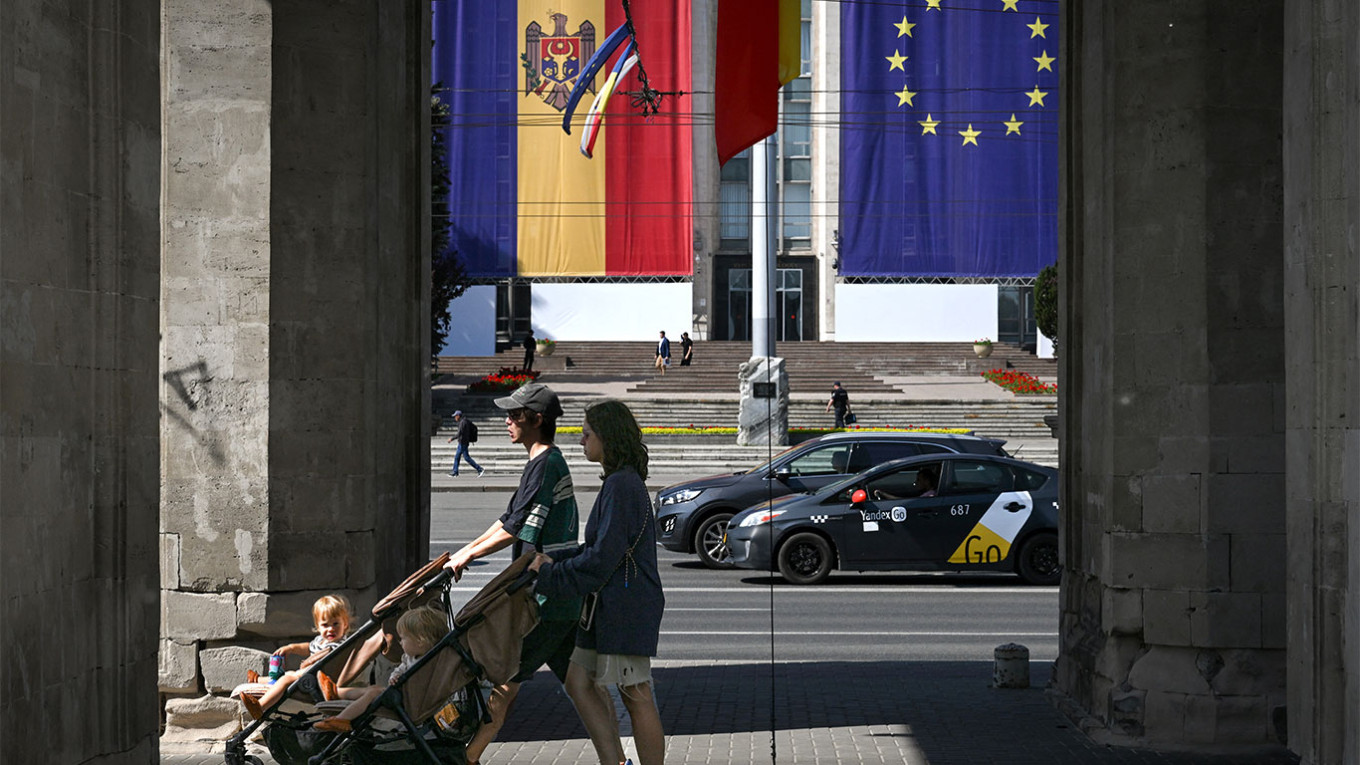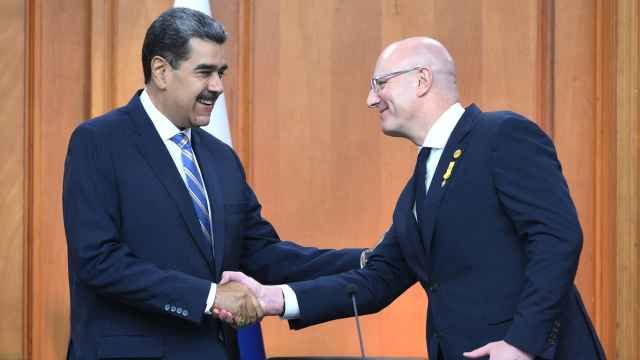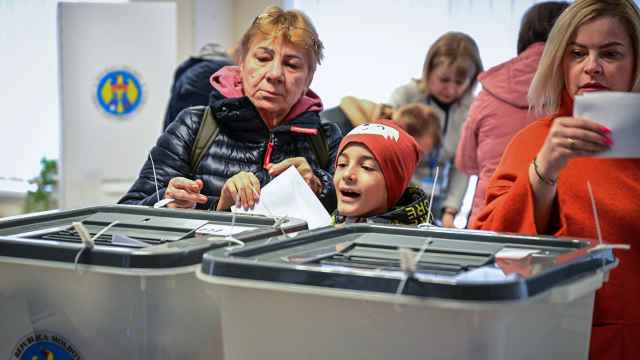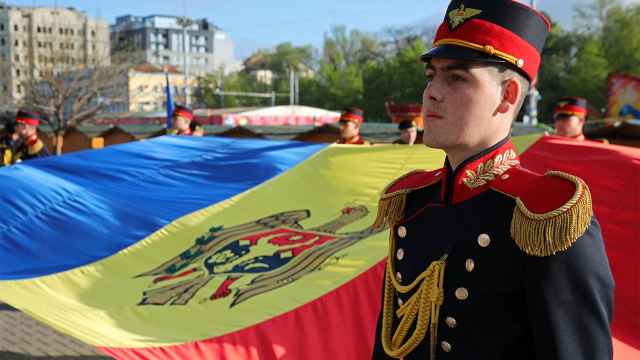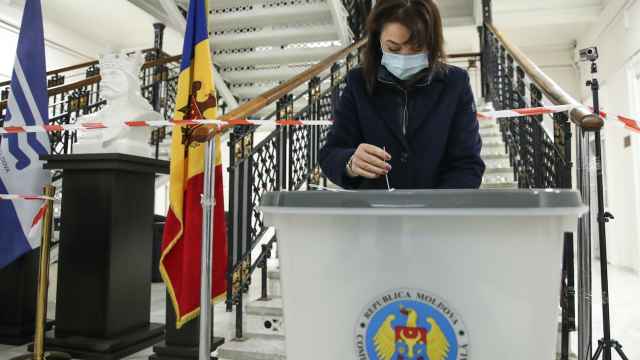CHISINAU — An estimated 80,000 people packed into the center of the Moldovan capital last month for the largest pro-European Union gathering in years as the ties binding this tiny eastern European country to Russia fray amid the war in Ukraine.
EU, NATO and Moldovan flags were visible all over Chisinau’s Great National Assembly Square on May 21 as attendees listened to speeches by Moldova’s pro-EU President Maia Sandu and the head of the European Parliament Roberta Metsola.
“The future is now!” shouted one member of the crowd as Sandu walked onstage to chants of “Maia Sandu” and “Europe.”
Nearby streets were lined with buses that had brought participants to the rally from all over this formerly Soviet country of 2.6 million people, which is sandwiched between the EU and Ukraine.
“With EU accession we will have so many more opportunities: the people who moved abroad can come back to their homeland,” said Eva-Marie, 26, referring to the tens of thousands of Moldovans who have chosen to live and work abroad.
“Today we are celebrating our culture and future,” she added as she took a break from dancing the traditional Moldovan hora with her friends.
Russia’s full-scale invasion of Ukraine and the ongoing fighting has sent shockwaves through one of Europe’s poorest countries and led to an upsurge in support for moving out of Russia’s orbit and closer to the EU.
More than 40 European leaders including Ukrainian President Volodymr Zelensky visited Chisinau on Thursday for the European Political Community’s second summit — reportedly the largest international event ever hosted by Moldova.
“Please do invest in our countries. Please do believe in our democracies, and in our EU future,” Sandu told reporters alongside Zelensky.
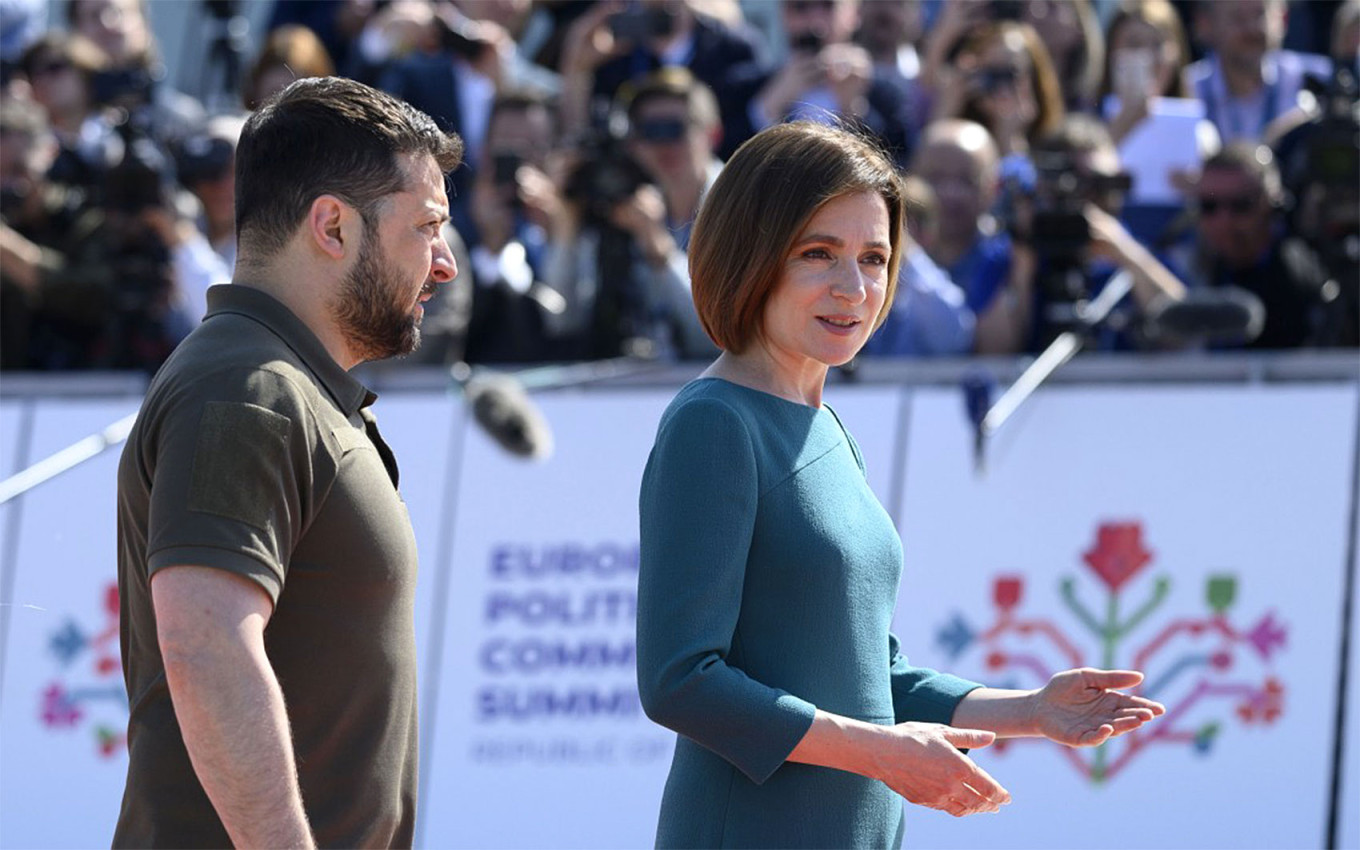
Along with Ukraine, Moldova was offered EU candidate status in July last year.
The fighting in Ukraine has spilled over into Moldova in recent months, with Russian missiles repeatedly entering Moldovan airspace and Sandu announcing in February that the country had foiled a Moscow-backed coup attempt. The allegation was strongly denied by Russia.
There have also been major blackouts in Moldova, spiraling inflation and an influx of refugees — per capita, Moldova has taken the most Ukrainian refugees of any EU country.
A state of emergency has been in place in Moldova ever since the Kremlin ordered tanks across the border into Ukraine on Feb. 24, 2022.
In particular, Moldovan officials accuse Russia of seeking to derail the country’s EU membership aspirations by fomenting instability, backing pro-Kremlin political forces and organizing rallies.
The size of the recent rally was a good indication that the level of pro-EU feeling in Moldova is growing, according to deputy speaker of Moldova’s parliament Mihai Popșoi.
“The vast majority of the public and the majority of the political establishment is clearly looking beyond Moldova's past and towards a future that is European,” he told The Moscow Times.
“That is the legitimate position voiced by Moldovan citizens in repeated democratic elections.”
Whereas pro-Western political groups in other former Soviet countries are generally more popular with younger people, most participants at last month’s rally appeared to be from the older generation that was born when Moldova was part of the U.S.S.R.
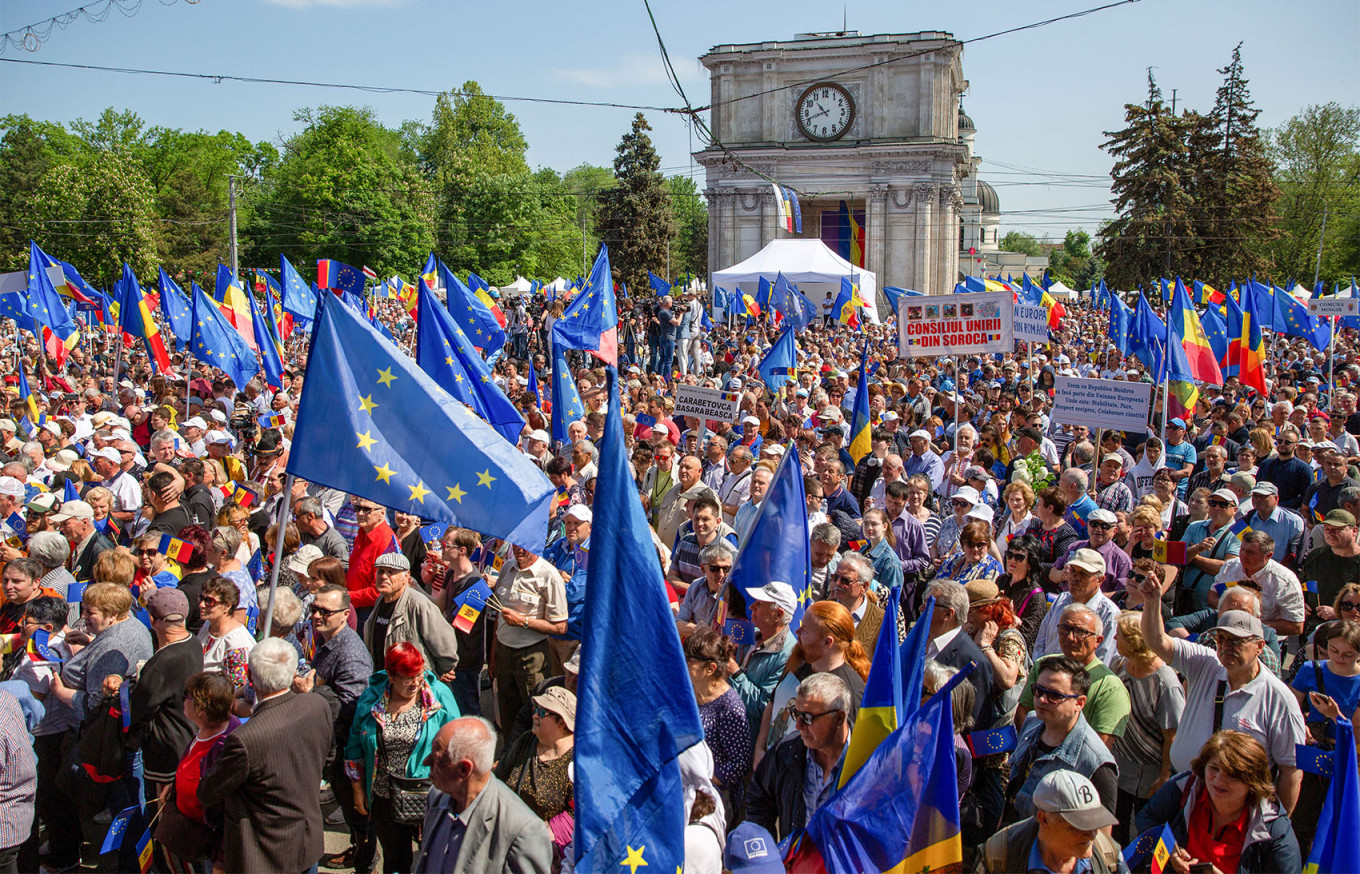
“We remember what it was like, terrible days,” said Vasile, 70, who had traveled by bus from his village in southern Moldova for the protest, referring to life in the Soviet Union.
However, analysts and experts acknowledge that breaking all ties with Russia will be a difficult goal to achieve in a country where, for cultural, economic and political reasons, a large number of people still look to Moscow.
There are estimated to be 1,000 Russian soldiers stationed in Moldova’s breakaway region of Transnistria, which has close political ties to the Kremlin and receives heavily subsidized natural gas supplies from Russia.
“The question is what would happen if there is a change of government either in the next elections or through non-constitutional means before that,” said Johan Engvall, an analyst at the Stockholm Center for Eastern European Studies.
“Russia is therefore likely to continue to try and undermine the current leadership in Moldova and intensify its support of pro-Russian political forces in order to try to bring Moldova under its control.”
Presidential elections in Moldova are scheduled to take place next year. If Sandu loses, it is not guaranteed that her successor will follow her pro-EU course.
A candidate from the pro-Russia Shor party was last month elected as governor in Moldova’s autonomous Gagauzia region.
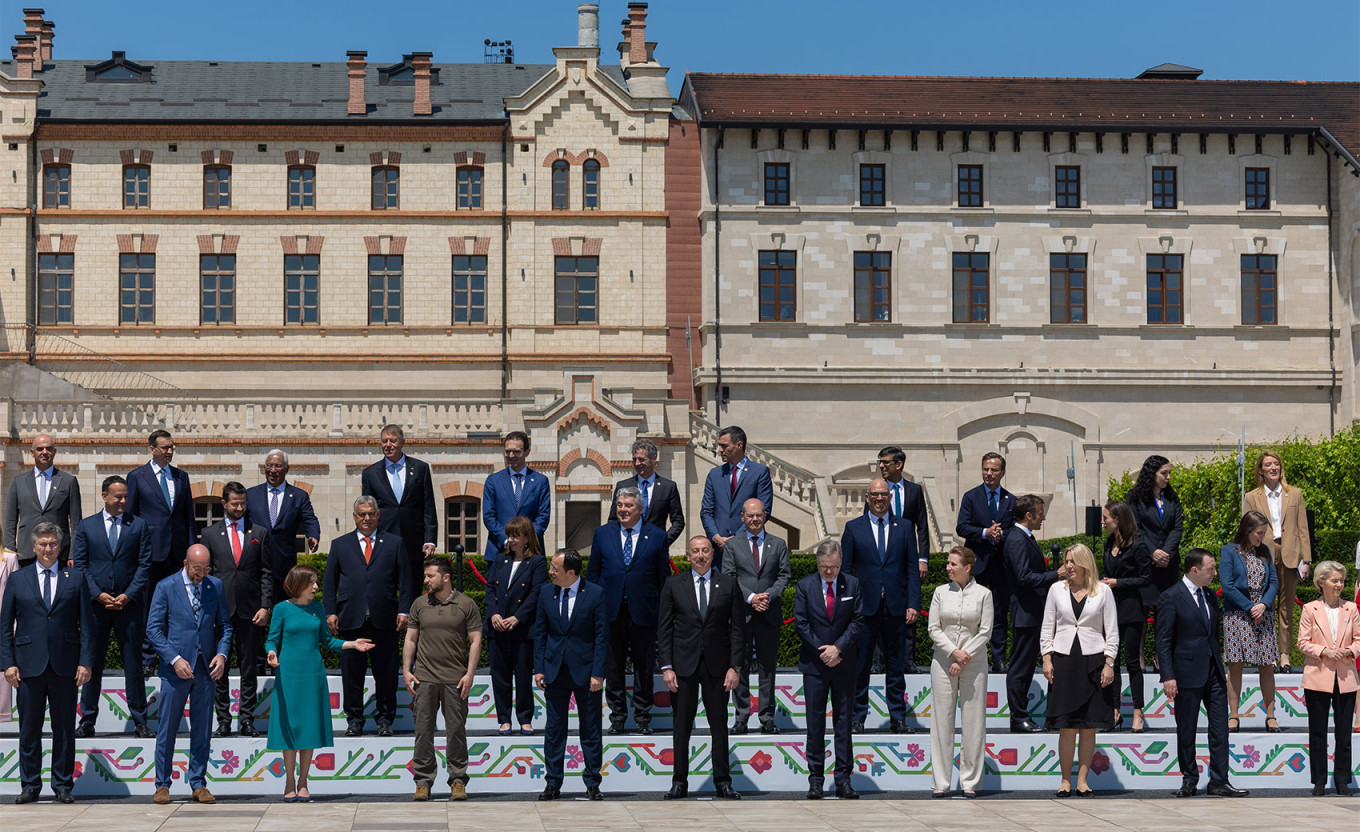
“The connection between Moldova and Russia won’t stop,” said Lyuba, 27, a veterinarian who lives in the Gagauzian capital Comrat.
“I am pro-EU, but Gagauzians supported Russia before the war and they support it now — we have many relatives there, they offer free places to us at universities,” she told The Moscow Times.
For any Moldovan leader seeking EU membership, Transnistria is a particularly thorny issue.
Although the war in Ukraine means Moscow is not able to move any more troops into the disputed region, it remains a bastion for those who want closer ties to Russia.
“Russia’s reduced capacity to intervene militarily in the breakaway statelet, will keep tensions fraught but stable,” said Ophelia Coutts, a Russia and Central Asia analyst at risk intelligence company Verisk Maplecroft.
Indications of weakening of institutional ties between Moscow and Chisinau have come thick and fast in recent months.
Not only is Moldova no longer dependent on Russian gas, but the country announced last month that it was taking steps to withdraw from the Interparliamentary Assembly of the Commonwealth of Independent States — a Russia-led group made up of some former Soviet countries.
Earlier this year, the Moldovan parliament voted to ditch “Moldovan” as the name of the official language as many believe it was simply a name given to the Romanian language in Soviet times.
In an interview with Bloomberg earlier this week, Sandu expressed confidence that Moldova could join the EU as soon as 2030.
At the recent pro-EU rally in Chisinau, Vasgen, 45, a Russian citizen who left Moscow for Chisinau soon after the full-scale invasion of Ukraine, said such gatherings sent a message to the Kremlin that Moldova was looking westwards.
“I’m certain that many Russian-speaking Moldovans are not against Putin,” he told The Moscow Times while draped in a Moldovan flag.
“But the people here can see that Europe opens up new perspectives.”
A Message from The Moscow Times:
Dear readers,
We are facing unprecedented challenges. Russia's Prosecutor General's Office has designated The Moscow Times as an "undesirable" organization, criminalizing our work and putting our staff at risk of prosecution. This follows our earlier unjust labeling as a "foreign agent."
These actions are direct attempts to silence independent journalism in Russia. The authorities claim our work "discredits the decisions of the Russian leadership." We see things differently: we strive to provide accurate, unbiased reporting on Russia.
We, the journalists of The Moscow Times, refuse to be silenced. But to continue our work, we need your help.
Your support, no matter how small, makes a world of difference. If you can, please support us monthly starting from just $2. It's quick to set up, and every contribution makes a significant impact.
By supporting The Moscow Times, you're defending open, independent journalism in the face of repression. Thank you for standing with us.
Remind me later.


